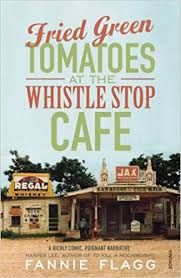Deepings Group enjoyed reading Fannie Flegg’s ‘Fried Green Tomatoes at the Whistle Stop Cafe’ and some members LOVED this charming book. We appreciated the strong characterisation: those who have experience of nursing homes said there is a Ninny Threadgoode in every one; Idgie, on the other hand, is a one-off – passionate, kind, enterprising, funny, brave, extreme – it was lovely to see her again at the end of the book, still telling her tall tales. This was a strong community with warm friendships and loyalties, support for each other, coping, and the sadness of the loss of the village with the decline of the railway. The vivid descriptions made us almost smell the food and hear the music and voices of both rural and city life in this Southern US state. The device of moving the story back and forwards using the humour and snide comments of Dot Weems’ Weekly Bulletin, worked well.

Fried Green Tomatoes at the Whistle Stop Cafe
Even those cynics amongst us who cringe a little at American sweet homespun wisdom and the occasional shmaltzy sentimental tone, felt that the book was certainly saved from tweeness by the extremely dark subject matter.
We were shown the cruelty and violence of racism, and the subtle differences made by having different shades of skin colour, even between brothers; the disquiet about the woman who could pass as white; the way the Klu Klux Klan worked – “they may be niggers but they’re our niggers”. The awful poverty and depression of The Depression and its intersection with that racism – even the hoboes, despised and beaten (perhaps to death) by some, were allowed through the front door of the cafe, the ‘coloureds’ had to quietly make their requests at the back. We saw the comfort and optimism of the black church and the acceptance by black and white of what we would now see as lesbianism.
There was domestic violence, the lack of rights for married women, particularly over the custody of children; then the sadness of infertility; the bringing up of a ‘special’ child; ageing; the dignity of people who struggled against scorn and adversity to make a better life for their children, and the grandchildren who saw that struggle as demeaning bowing and scraping.
There was murder, even cannibalism (albeit unwitting on the part of some diners) and assisted dying.
For a slim, easy-to-read volume, Fannie Flegg’s masterpiece packs quite a punch!
